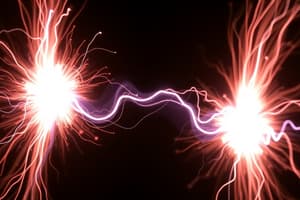Podcast
Questions and Answers
Explain the magnetic effects of electric current and the discoveries made by Hans Christian Oersted and Michael Faraday.
Explain the magnetic effects of electric current and the discoveries made by Hans Christian Oersted and Michael Faraday.
The magnetic effects of electric current refer to the generation of a magnetic field around a current-carrying conductor. Hans Christian Oersted discovered that a compass needle got deflected when a current-carrying conductor was placed nearby, indicating the production of a magnetic field. Michael Faraday discovered electromagnetic induction, showing that a changing magnetic field induces an electric current in a circuit.
Describe the principles of electromagnetism and the applications of electromagnets.
Describe the principles of electromagnetism and the applications of electromagnets.
The principles of electromagnetism involve the creation of a magnetic field through the flow of electric current. The applications of electromagnets include their use in electric motors, generators, transformers, and various industrial applications such as magnetic separation and magnetic resonance imaging (MRI).
Discuss the role of a solenoid in generating a magnetic field and its applications in everyday devices.
Discuss the role of a solenoid in generating a magnetic field and its applications in everyday devices.
A solenoid is a coil of wire that generates a magnetic field when an electric current passes through it. It is used in applications such as electromagnetic locks, doorbells, and inductors for electronic circuits. The magnetic field produced by a solenoid is similar to that of a bar magnet, with distinct north and south poles.
Explain Maxwell's right-hand grip rule and its significance in understanding magnetic fields around a current-carrying conductor.
Explain Maxwell's right-hand grip rule and its significance in understanding magnetic fields around a current-carrying conductor.
Explain Fleming's left-hand rule and its application in understanding the interaction between magnetic fields and electric currents.
Explain Fleming's left-hand rule and its application in understanding the interaction between magnetic fields and electric currents.
Flashcards are hidden until you start studying
Study Notes
Magnetic Effects of Electric Current
- Magnetic field is produced by a straight conductor, and the magnetic field lines are circular
- Maxwell's Right-Hand Rule is used to determine the direction of the magnetic field
- When a current flows through a loop, the magnetic field lines pass through the loop
Magnetic Field Due to a Current-Carrying Conductor
- Electromagnetic force is experienced by a current-carrying conductor in a magnetic field
- Fleming's Left-Hand Rule is used to determine the direction of the electromagnetic force
- The principle of the electric motor is based on the electromagnetic force
Hans Christian Oersted's Discovery
- Oersted discovered that a compass needle gets deflected when a current-carrying wire is placed nearby
- The deflection of the compass is due to the magnetic field produced by the electric current around the metallic conductor
- The magnetic field is produced by the electric current flowing through the conductor
Fleming's Right-Hand Rule
- The rule is used to determine the direction of the induced current in a circuit
- It is used to find the direction of the induced current when a change in magnetic flux occurs
Galvanometer
- A galvanometer is used to detect the induced current in a circuit
- It is a sensitive device that can detect even small changes in current
Studying That Suits You
Use AI to generate personalized quizzes and flashcards to suit your learning preferences.




